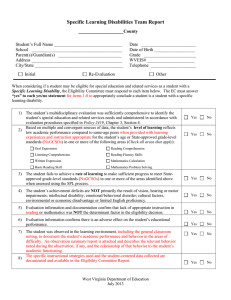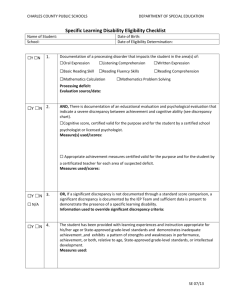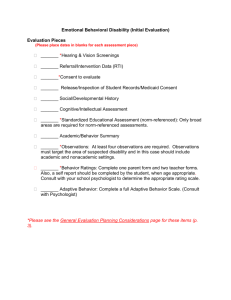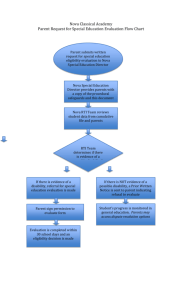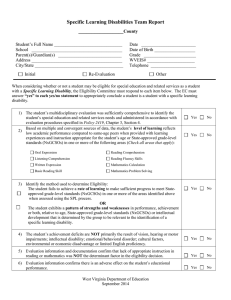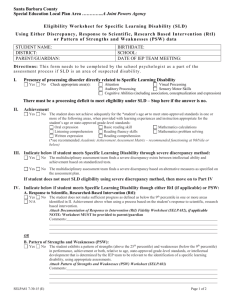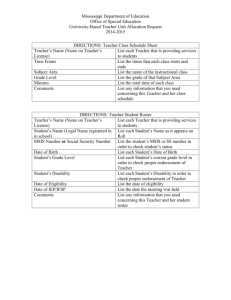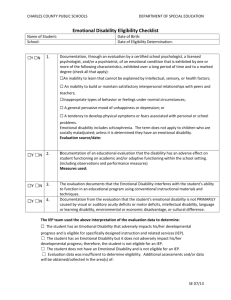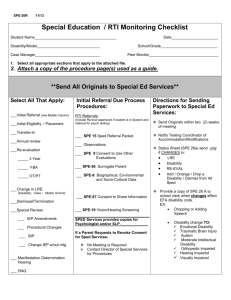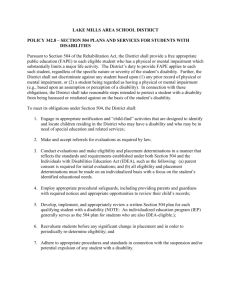Special Education Evaluation Information
advertisement
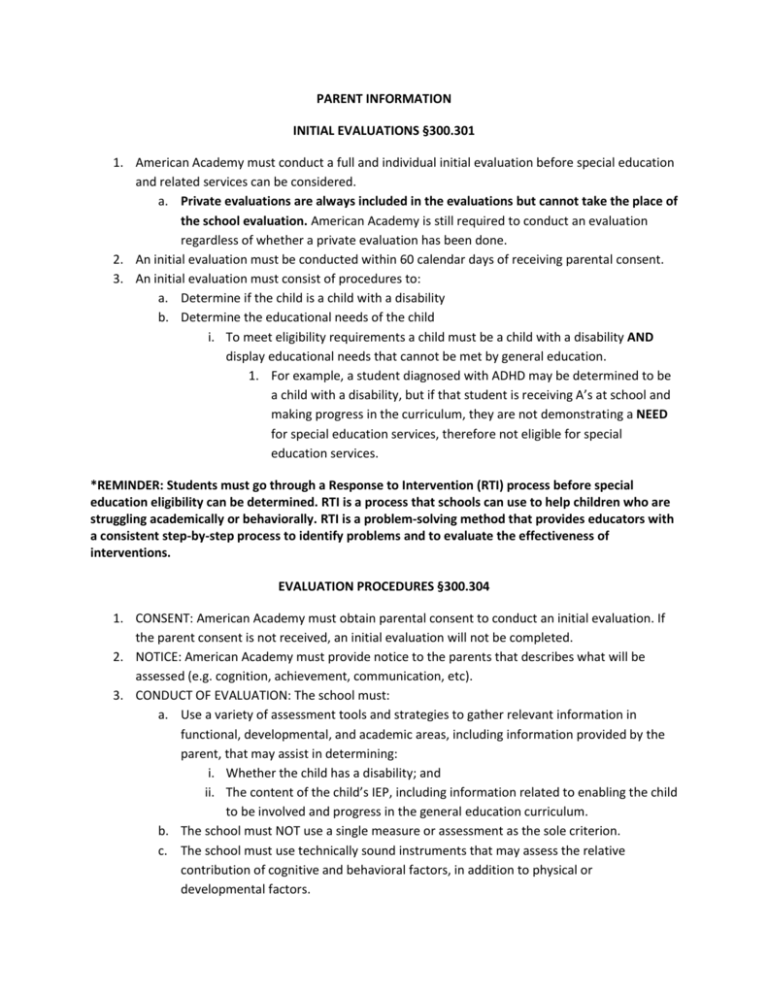
PARENT INFORMATION INITIAL EVALUATIONS §300.301 1. American Academy must conduct a full and individual initial evaluation before special education and related services can be considered. a. Private evaluations are always included in the evaluations but cannot take the place of the school evaluation. American Academy is still required to conduct an evaluation regardless of whether a private evaluation has been done. 2. An initial evaluation must be conducted within 60 calendar days of receiving parental consent. 3. An initial evaluation must consist of procedures to: a. Determine if the child is a child with a disability b. Determine the educational needs of the child i. To meet eligibility requirements a child must be a child with a disability AND display educational needs that cannot be met by general education. 1. For example, a student diagnosed with ADHD may be determined to be a child with a disability, but if that student is receiving A’s at school and making progress in the curriculum, they are not demonstrating a NEED for special education services, therefore not eligible for special education services. *REMINDER: Students must go through a Response to Intervention (RTI) process before special education eligibility can be determined. RTI is a process that schools can use to help children who are struggling academically or behaviorally. RTI is a problem-solving method that provides educators with a consistent step-by-step process to identify problems and to evaluate the effectiveness of interventions. EVALUATION PROCEDURES §300.304 1. CONSENT: American Academy must obtain parental consent to conduct an initial evaluation. If the parent consent is not received, an initial evaluation will not be completed. 2. NOTICE: American Academy must provide notice to the parents that describes what will be assessed (e.g. cognition, achievement, communication, etc). 3. CONDUCT OF EVALUATION: The school must: a. Use a variety of assessment tools and strategies to gather relevant information in functional, developmental, and academic areas, including information provided by the parent, that may assist in determining: i. Whether the child has a disability; and ii. The content of the child’s IEP, including information related to enabling the child to be involved and progress in the general education curriculum. b. The school must NOT use a single measure or assessment as the sole criterion. c. The school must use technically sound instruments that may assess the relative contribution of cognitive and behavioral factors, in addition to physical or developmental factors. **The child must be assessed in all areas related to the suspected disability including, if appropriate, health, vision, hearing, social and emotional status, general intelligence, academic performance, communicative status, and motor abilities. SPECIFIC DOCUMENTATION FOR ELIGIBILITY DETERMINATION §300.311 For a child suspected of having a specific learning disability, the eligibility documentation must contain statements of the following: 1. Whether the child has a specific learning disability; 2. The basis for making the determination, including an assurance that the determination has been made in accordance with §300.306. a. To be in accordance with §300.306 the team must have drawn upon information from a variety of sources, including aptitude and achievement tests, parent input, and teacher recommendations, as well as information about the child’s physical condition, social or cultural background, and adaptive behavior; and ensure that information obtained from all of these sources is documented and carefully considered. 3. The relevant behavior, if any, noted during the observation of the child and the relationship of that behavior to the child’s academic functioning; 4. Any educationally relevant medical findings; 5. Whether— a. The child does not achieve adequately for the child’s age or to meet State-approved grade-level standards. b. The child does not make sufficient progress to meet age or State-approved grade-level standards. 6. Whether the team has ruled out visual, hearing, or motor disability; mental retardation; emotional disturbance, cultural factors; environmental or economic disadvantage; or limited English proficiency. 7. If the child has participated in a process that assesses the child’s responses to scientific, research-based intervention (Response to Intervention process). ADDITIONAL REQUIREMENTS §300.305 1. Review of existing evaluation data. As PART of an initial evaluation and/or re-evaluation, the IEP Team must: a. Review existing evaluation data including: i. Evaluations and information provided by the parent of the child; ii. Current classroom-based, local, or State assessments, and classroom-based observations; iii. Observations by teacher and related services providers; OBSERVATION §300.310: The public agency must ensure that the child is observed in the child’s learning environment (including the regular classroom setting) to document the child’s academic performance and behavior in the areas of difficulty.
